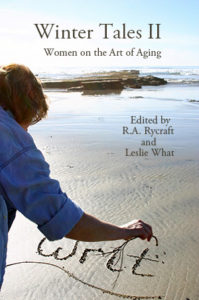 Review by Linda McCauley Freeman
Review by Linda McCauley Freeman
– There is one thing we all do, regardless of race, creed or color: we age. Since there’s no avoiding it, we might as well do it gracefully, thoughtfully, artfully. And so, editors Rycraft and What have created a collection of poems, essays, photos and cartoons on the female response to aging that presents us with a full spectrum of perspectives: the humor, the horror, the irony, the resistance and the resignation.
By reading an anthology such as this we can stand shoulder to shoulder with others who are aging as we are, to have that feeling of relief that we are not going it alone, that “she feels it, too, in many of the same ways I do!”. Throughout this book are moments of recognition that make it so satisfying as a reader, as a woman, and as a human being.
Take Gladys Swan’s opening essay, A Few Fragments: “Fragments from my childhood keep emerging, moments of intense emotion or memorable consequences, but now with a sense of distance. Oh my—that happened sixty-odd years ago.”
It is that striking realization we all suddenly feel. How can something so embedded in our psyche, in the perpetual now of our being, have happened so very long ago? Our perception of time and space shifts, as does our perception of what is vitally important. As Elisabeth Murawski says in the opening lines of her poem: voyage to the end: “I sin so much harder now/knowing what I know” and Leigh Anne Jasheway’s humorous The Theory of Aging Relativity, which states, “Einstein…proved that it doesn’t matter where you are in time, but how much space there is between your age and what you perceive as “old.” And, the further you move along the timeline, the more space there must be.”
One of my favorite poets is Dorianne Laux, and she must be a favorite of the editors as well since five of her poems appear here. Her poems, like much of the other work in this book, are reflections on personal aging as well as parental aging. In Dark Charms she laments, “The clear water we drank as thirsty children /still runs through our veins. Stars we saw then/we still see now, only fewer, dimmer, less often.”
Part of our own aging is the sudden upside-down world we are cast into by our parents’ aging. And no anthology can be complete without including this. For as old as we get, if they are still around, our parents are that much older, foreshadowing our journey. And no matter what the parent/child relationship was in our youth, in our adulthood that relationship trades places: the parent becomes the child. In Mother’s Day, Laux writes: I passed through the narrow hills/ of my mother’s hips one cold morning/ and never looked back, until now, clipping/her tough toenails the yellow of blanched corn,/sitting with her on the bed’s edge,/combing out the tuft of hair at the crown/.
This is a collection you can take to bed with you and lose yourself in as you find yourself page by page, essay by essay, poem by poem.
Winter Tales II: Women on the Art of Aging
Editors: RA Rycraft and Leslie What
Serving House Books, LLC, 2012
Paperback: $12
Linda McCauley Freeman has an MFA in Writing and Literature from Bennington College. She was the poet-in-residence for the Putnam County Arts Council for five years overlapping with an eleven-year corporate career as Executive Director of Global Communications for an international firm. She is a columnist for Living & Being Magazine and a three-time winner of the Talespinners Short Story contest, in which she finally was asked to be a judge alongside Simon & Schuster editor Michael Korda and children’s book author Da Chen. Her works have been published in literary journals including the MOM EGG. She is working on a novel. Since 2004, she and her husband, Chester, have been full-time swing dance instructors in the Hudson Valley, NY www.got2lindy.com.
